Analysis of the Contemporary Hospitality Industry: UK Report
VerifiedAdded on 2020/11/23
|10
|2464
|368
Report
AI Summary
This report provides a comprehensive overview of the contemporary hospitality industry, focusing on its scale, diversity, and contribution to the UK economy. It delves into the organizational structures prevalent in the industry, including functional and flat structures, and examines the roles and responsibilities of various professional bodies like the British Institute of Innkeeping and the Institute of Hospitality. The report further analyzes staffing requirements, emphasizing the importance of matching staff to business needs and the roles, qualifications, and responsibilities of hospitality staff. The report also highlights the importance of training, customer satisfaction, and maintaining a hygienic environment. The conclusion summarizes the growth of the hospitality industry and the role of development bodies in assisting the sector.
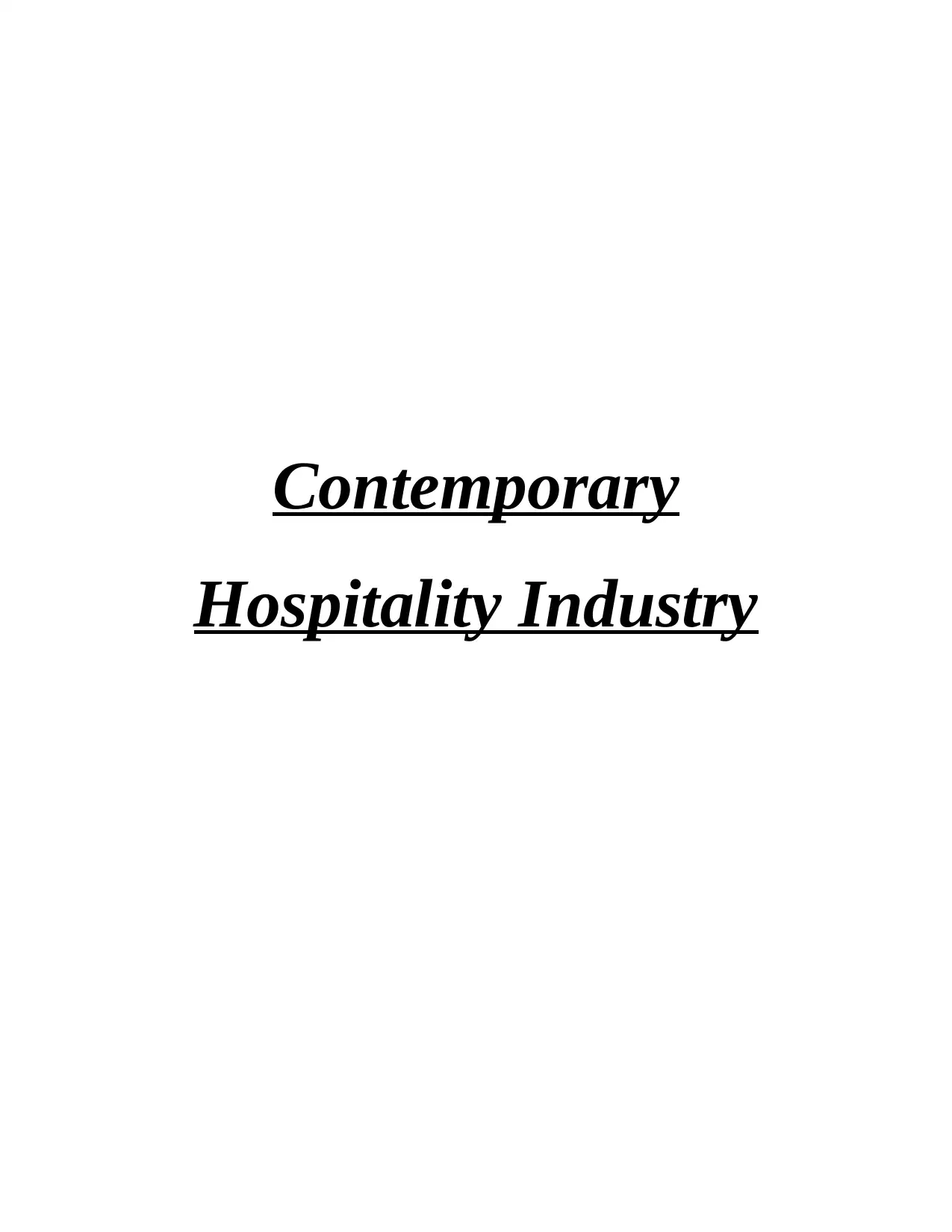
Contemporary
Hospitality Industry
Hospitality Industry
Paraphrase This Document
Need a fresh take? Get an instant paraphrase of this document with our AI Paraphraser
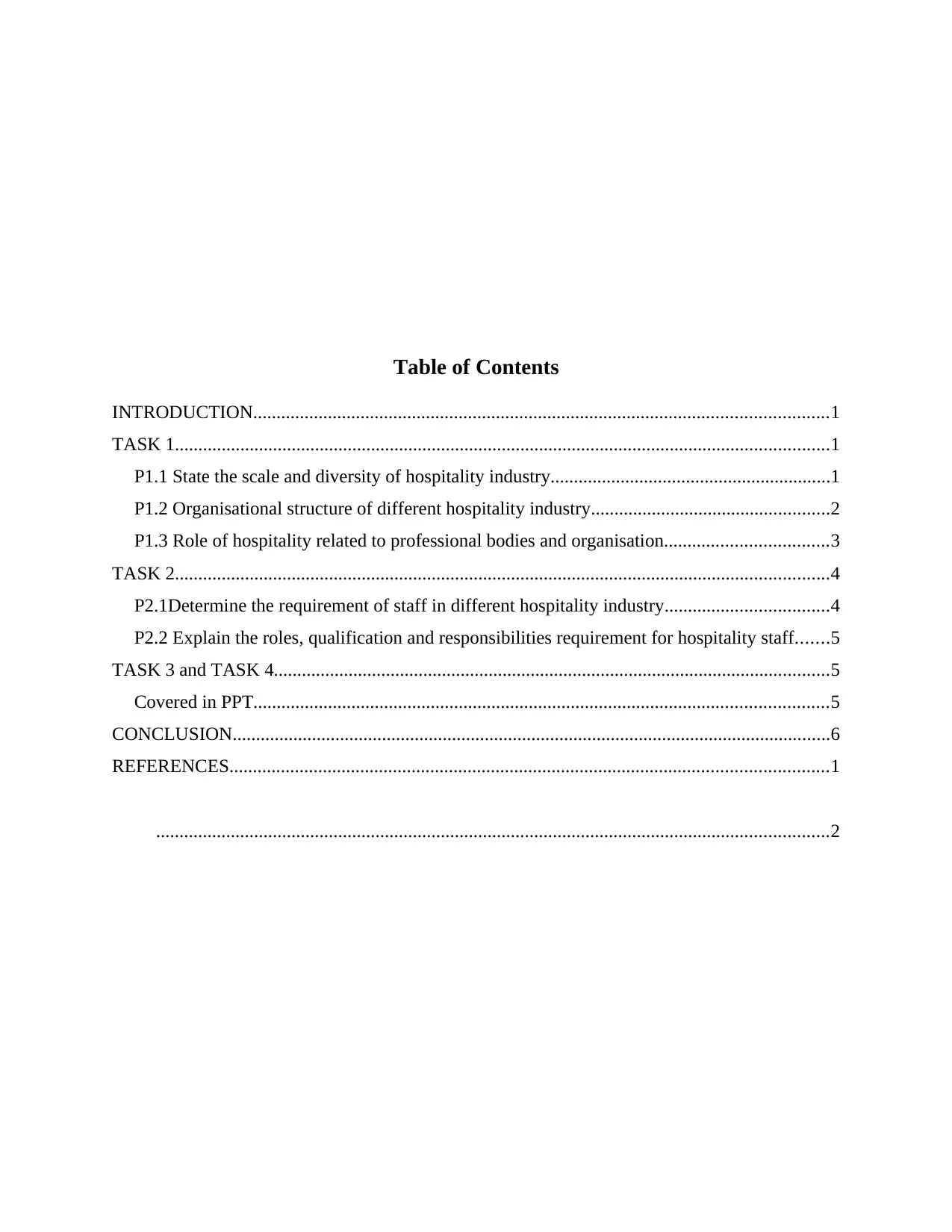
Table of Contents
INTRODUCTION...........................................................................................................................1
TASK 1............................................................................................................................................1
P1.1 State the scale and diversity of hospitality industry............................................................1
P1.2 Organisational structure of different hospitality industry...................................................2
P1.3 Role of hospitality related to professional bodies and organisation...................................3
TASK 2............................................................................................................................................4
P2.1Determine the requirement of staff in different hospitality industry...................................4
P2.2 Explain the roles, qualification and responsibilities requirement for hospitality staff.......5
TASK 3 and TASK 4.......................................................................................................................5
Covered in PPT...........................................................................................................................5
CONCLUSION................................................................................................................................6
REFERENCES................................................................................................................................1
................................................................................................................................................2
INTRODUCTION...........................................................................................................................1
TASK 1............................................................................................................................................1
P1.1 State the scale and diversity of hospitality industry............................................................1
P1.2 Organisational structure of different hospitality industry...................................................2
P1.3 Role of hospitality related to professional bodies and organisation...................................3
TASK 2............................................................................................................................................4
P2.1Determine the requirement of staff in different hospitality industry...................................4
P2.2 Explain the roles, qualification and responsibilities requirement for hospitality staff.......5
TASK 3 and TASK 4.......................................................................................................................5
Covered in PPT...........................................................................................................................5
CONCLUSION................................................................................................................................6
REFERENCES................................................................................................................................1
................................................................................................................................................2
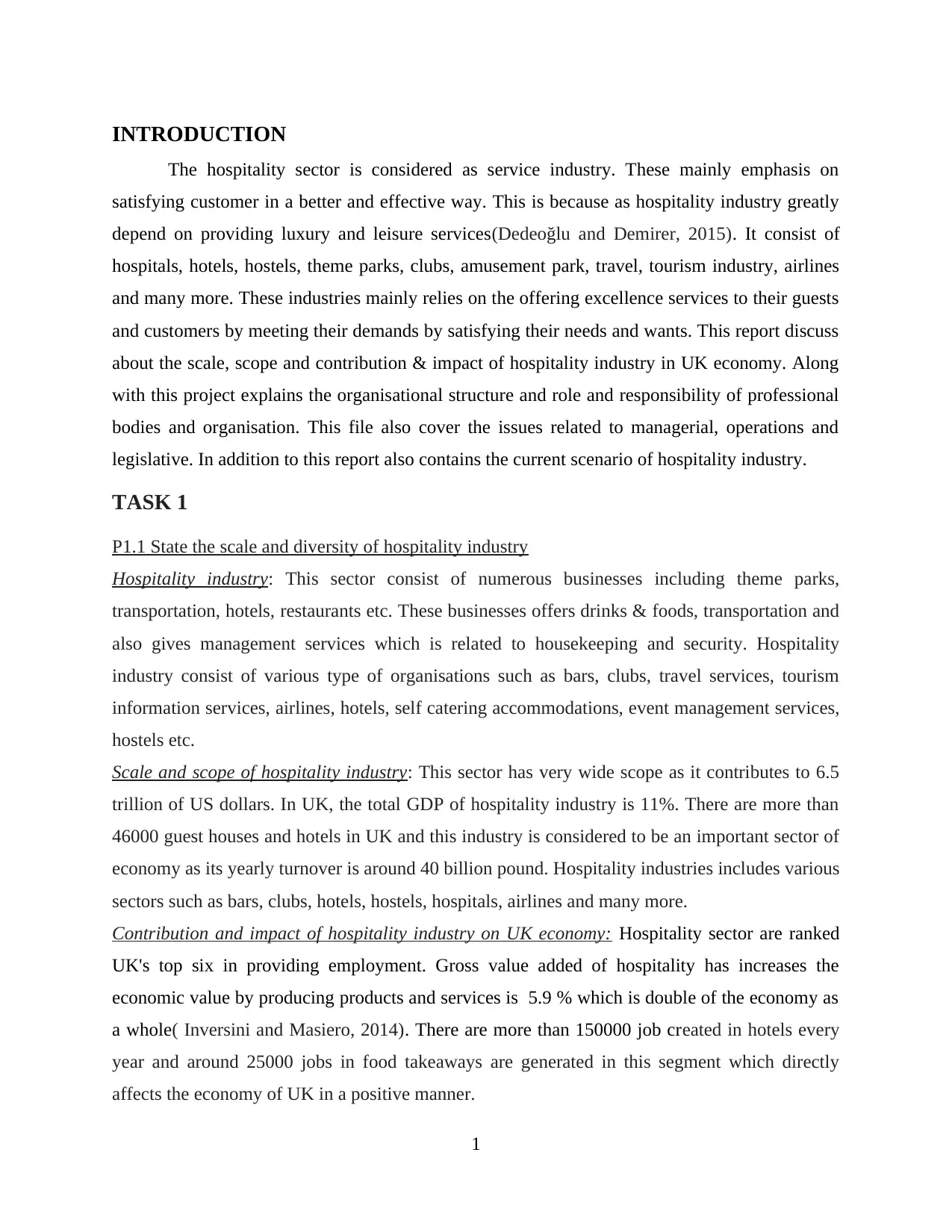
INTRODUCTION
The hospitality sector is considered as service industry. These mainly emphasis on
satisfying customer in a better and effective way. This is because as hospitality industry greatly
depend on providing luxury and leisure services(Dedeoğlu and Demirer, 2015). It consist of
hospitals, hotels, hostels, theme parks, clubs, amusement park, travel, tourism industry, airlines
and many more. These industries mainly relies on the offering excellence services to their guests
and customers by meeting their demands by satisfying their needs and wants. This report discuss
about the scale, scope and contribution & impact of hospitality industry in UK economy. Along
with this project explains the organisational structure and role and responsibility of professional
bodies and organisation. This file also cover the issues related to managerial, operations and
legislative. In addition to this report also contains the current scenario of hospitality industry.
TASK 1
P1.1 State the scale and diversity of hospitality industry
Hospitality industry: This sector consist of numerous businesses including theme parks,
transportation, hotels, restaurants etc. These businesses offers drinks & foods, transportation and
also gives management services which is related to housekeeping and security. Hospitality
industry consist of various type of organisations such as bars, clubs, travel services, tourism
information services, airlines, hotels, self catering accommodations, event management services,
hostels etc.
Scale and scope of hospitality industry: This sector has very wide scope as it contributes to 6.5
trillion of US dollars. In UK, the total GDP of hospitality industry is 11%. There are more than
46000 guest houses and hotels in UK and this industry is considered to be an important sector of
economy as its yearly turnover is around 40 billion pound. Hospitality industries includes various
sectors such as bars, clubs, hotels, hostels, hospitals, airlines and many more.
Contribution and impact of hospitality industry on UK economy: Hospitality sector are ranked
UK's top six in providing employment. Gross value added of hospitality has increases the
economic value by producing products and services is 5.9 % which is double of the economy as
a whole( Inversini and Masiero, 2014). There are more than 150000 job created in hotels every
year and around 25000 jobs in food takeaways are generated in this segment which directly
affects the economy of UK in a positive manner.
1
The hospitality sector is considered as service industry. These mainly emphasis on
satisfying customer in a better and effective way. This is because as hospitality industry greatly
depend on providing luxury and leisure services(Dedeoğlu and Demirer, 2015). It consist of
hospitals, hotels, hostels, theme parks, clubs, amusement park, travel, tourism industry, airlines
and many more. These industries mainly relies on the offering excellence services to their guests
and customers by meeting their demands by satisfying their needs and wants. This report discuss
about the scale, scope and contribution & impact of hospitality industry in UK economy. Along
with this project explains the organisational structure and role and responsibility of professional
bodies and organisation. This file also cover the issues related to managerial, operations and
legislative. In addition to this report also contains the current scenario of hospitality industry.
TASK 1
P1.1 State the scale and diversity of hospitality industry
Hospitality industry: This sector consist of numerous businesses including theme parks,
transportation, hotels, restaurants etc. These businesses offers drinks & foods, transportation and
also gives management services which is related to housekeeping and security. Hospitality
industry consist of various type of organisations such as bars, clubs, travel services, tourism
information services, airlines, hotels, self catering accommodations, event management services,
hostels etc.
Scale and scope of hospitality industry: This sector has very wide scope as it contributes to 6.5
trillion of US dollars. In UK, the total GDP of hospitality industry is 11%. There are more than
46000 guest houses and hotels in UK and this industry is considered to be an important sector of
economy as its yearly turnover is around 40 billion pound. Hospitality industries includes various
sectors such as bars, clubs, hotels, hostels, hospitals, airlines and many more.
Contribution and impact of hospitality industry on UK economy: Hospitality sector are ranked
UK's top six in providing employment. Gross value added of hospitality has increases the
economic value by producing products and services is 5.9 % which is double of the economy as
a whole( Inversini and Masiero, 2014). There are more than 150000 job created in hotels every
year and around 25000 jobs in food takeaways are generated in this segment which directly
affects the economy of UK in a positive manner.
1
⊘ This is a preview!⊘
Do you want full access?
Subscribe today to unlock all pages.

Trusted by 1+ million students worldwide
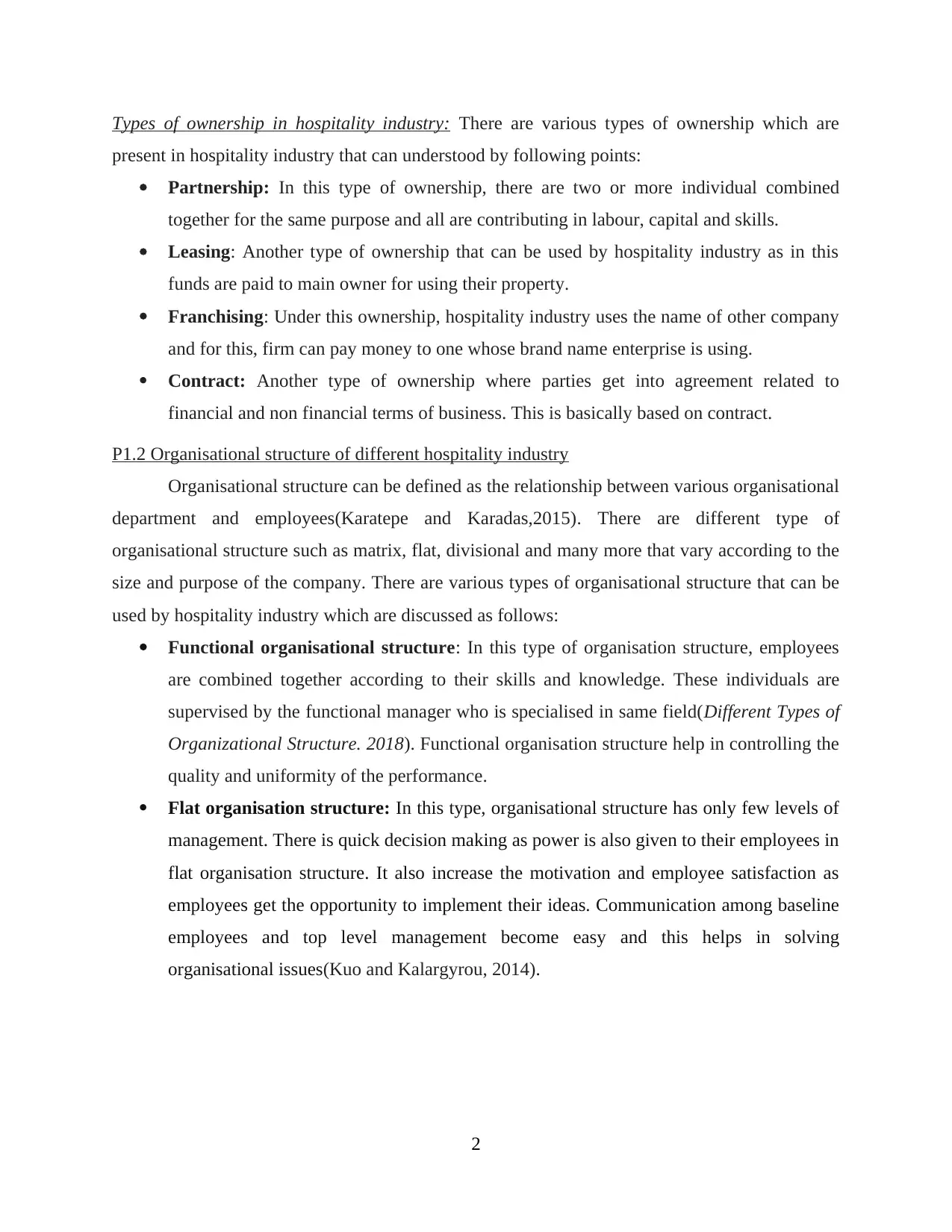
Types of ownership in hospitality industry: There are various types of ownership which are
present in hospitality industry that can understood by following points:
Partnership: In this type of ownership, there are two or more individual combined
together for the same purpose and all are contributing in labour, capital and skills.
Leasing: Another type of ownership that can be used by hospitality industry as in this
funds are paid to main owner for using their property.
Franchising: Under this ownership, hospitality industry uses the name of other company
and for this, firm can pay money to one whose brand name enterprise is using.
Contract: Another type of ownership where parties get into agreement related to
financial and non financial terms of business. This is basically based on contract.
P1.2 Organisational structure of different hospitality industry
Organisational structure can be defined as the relationship between various organisational
department and employees(Karatepe and Karadas,2015). There are different type of
organisational structure such as matrix, flat, divisional and many more that vary according to the
size and purpose of the company. There are various types of organisational structure that can be
used by hospitality industry which are discussed as follows:
Functional organisational structure: In this type of organisation structure, employees
are combined together according to their skills and knowledge. These individuals are
supervised by the functional manager who is specialised in same field(Different Types of
Organizational Structure. 2018). Functional organisation structure help in controlling the
quality and uniformity of the performance.
Flat organisation structure: In this type, organisational structure has only few levels of
management. There is quick decision making as power is also given to their employees in
flat organisation structure. It also increase the motivation and employee satisfaction as
employees get the opportunity to implement their ideas. Communication among baseline
employees and top level management become easy and this helps in solving
organisational issues(Kuo and Kalargyrou, 2014).
2
present in hospitality industry that can understood by following points:
Partnership: In this type of ownership, there are two or more individual combined
together for the same purpose and all are contributing in labour, capital and skills.
Leasing: Another type of ownership that can be used by hospitality industry as in this
funds are paid to main owner for using their property.
Franchising: Under this ownership, hospitality industry uses the name of other company
and for this, firm can pay money to one whose brand name enterprise is using.
Contract: Another type of ownership where parties get into agreement related to
financial and non financial terms of business. This is basically based on contract.
P1.2 Organisational structure of different hospitality industry
Organisational structure can be defined as the relationship between various organisational
department and employees(Karatepe and Karadas,2015). There are different type of
organisational structure such as matrix, flat, divisional and many more that vary according to the
size and purpose of the company. There are various types of organisational structure that can be
used by hospitality industry which are discussed as follows:
Functional organisational structure: In this type of organisation structure, employees
are combined together according to their skills and knowledge. These individuals are
supervised by the functional manager who is specialised in same field(Different Types of
Organizational Structure. 2018). Functional organisation structure help in controlling the
quality and uniformity of the performance.
Flat organisation structure: In this type, organisational structure has only few levels of
management. There is quick decision making as power is also given to their employees in
flat organisation structure. It also increase the motivation and employee satisfaction as
employees get the opportunity to implement their ideas. Communication among baseline
employees and top level management become easy and this helps in solving
organisational issues(Kuo and Kalargyrou, 2014).
2
Paraphrase This Document
Need a fresh take? Get an instant paraphrase of this document with our AI Paraphraser
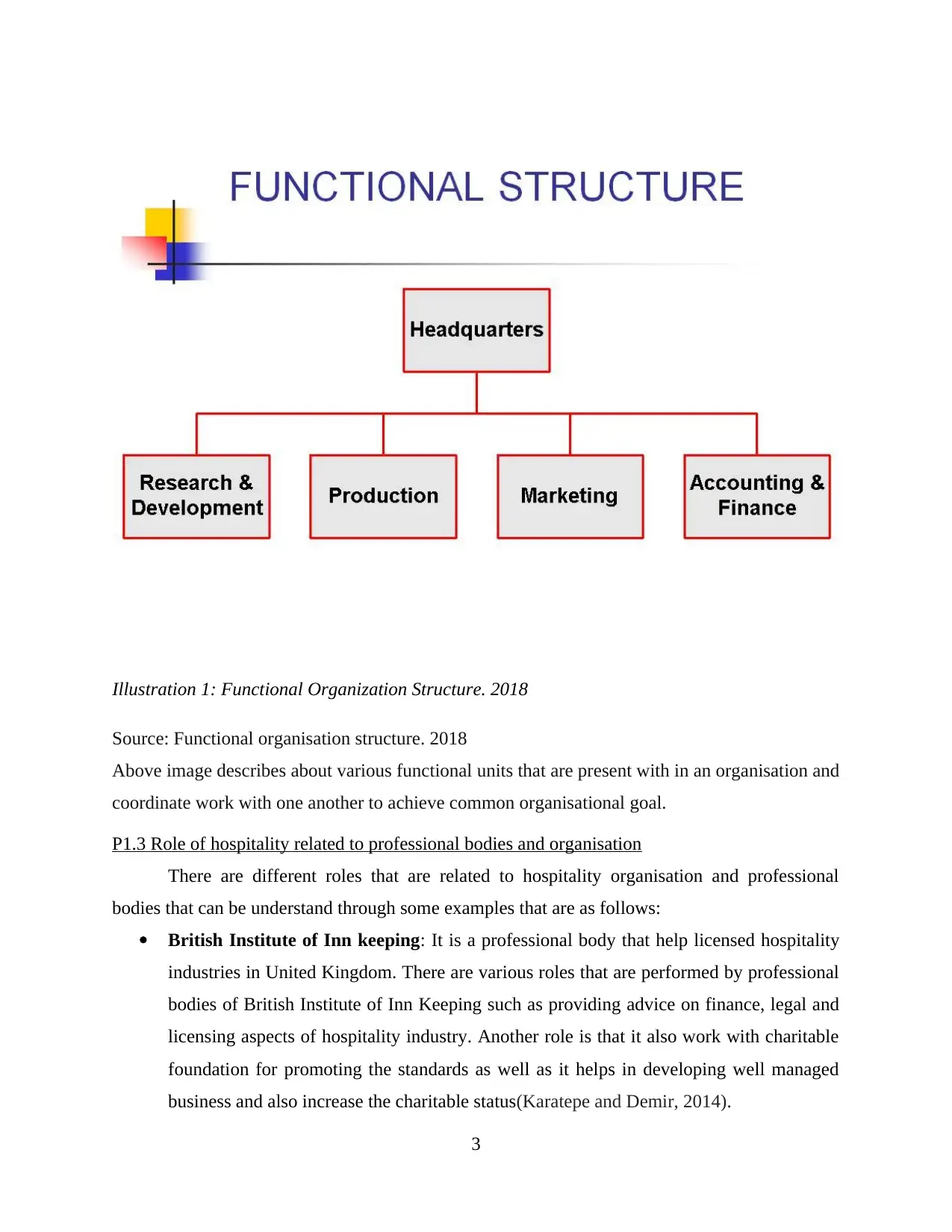
Source: Functional organisation structure. 2018
Above image describes about various functional units that are present with in an organisation and
coordinate work with one another to achieve common organisational goal.
P1.3 Role of hospitality related to professional bodies and organisation
There are different roles that are related to hospitality organisation and professional
bodies that can be understand through some examples that are as follows:
British Institute of Inn keeping: It is a professional body that help licensed hospitality
industries in United Kingdom. There are various roles that are performed by professional
bodies of British Institute of Inn Keeping such as providing advice on finance, legal and
licensing aspects of hospitality industry. Another role is that it also work with charitable
foundation for promoting the standards as well as it helps in developing well managed
business and also increase the charitable status(Karatepe and Demir, 2014).
3
Illustration 1: Functional Organization Structure. 2018
Above image describes about various functional units that are present with in an organisation and
coordinate work with one another to achieve common organisational goal.
P1.3 Role of hospitality related to professional bodies and organisation
There are different roles that are related to hospitality organisation and professional
bodies that can be understand through some examples that are as follows:
British Institute of Inn keeping: It is a professional body that help licensed hospitality
industries in United Kingdom. There are various roles that are performed by professional
bodies of British Institute of Inn Keeping such as providing advice on finance, legal and
licensing aspects of hospitality industry. Another role is that it also work with charitable
foundation for promoting the standards as well as it helps in developing well managed
business and also increase the charitable status(Karatepe and Demir, 2014).
3
Illustration 1: Functional Organization Structure. 2018
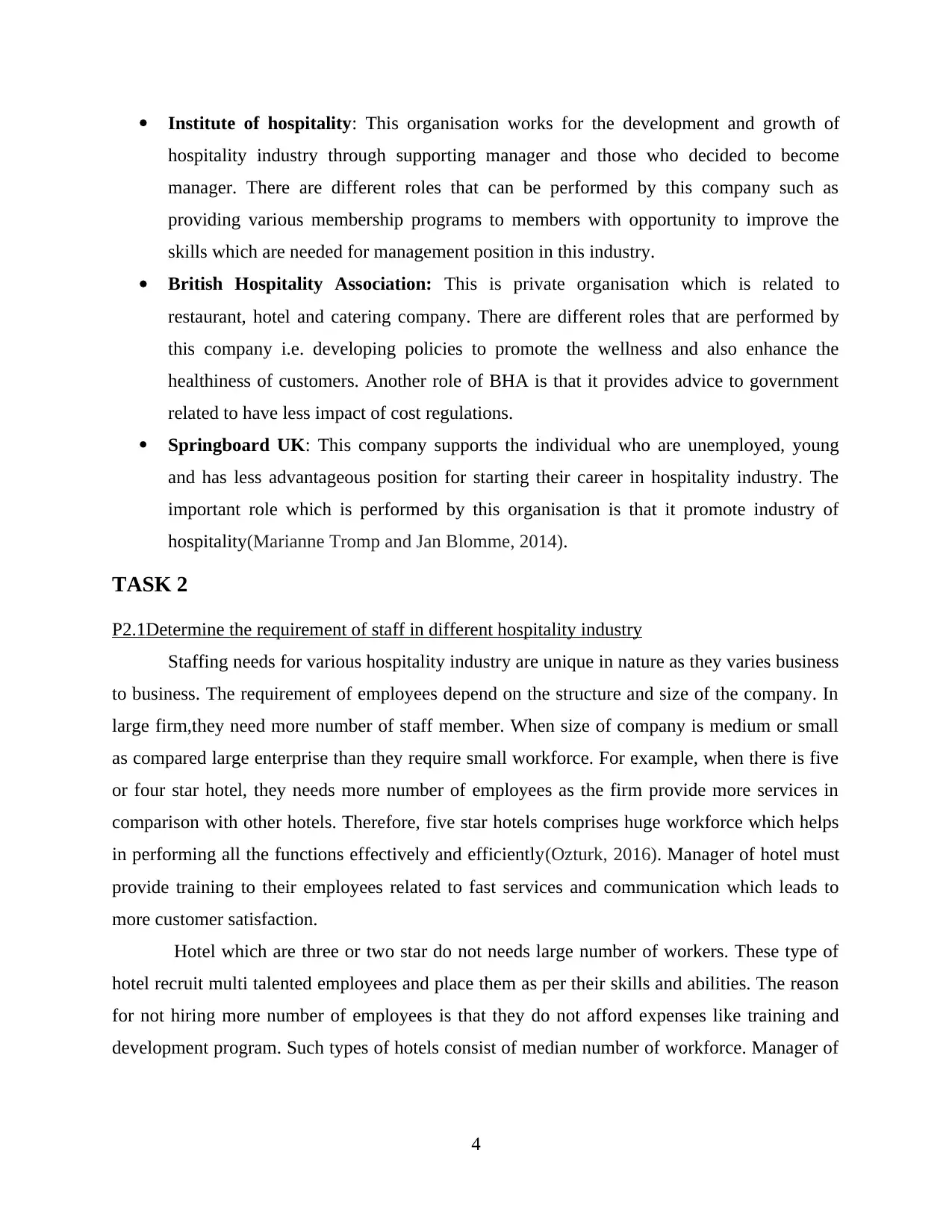
Institute of hospitality: This organisation works for the development and growth of
hospitality industry through supporting manager and those who decided to become
manager. There are different roles that can be performed by this company such as
providing various membership programs to members with opportunity to improve the
skills which are needed for management position in this industry.
British Hospitality Association: This is private organisation which is related to
restaurant, hotel and catering company. There are different roles that are performed by
this company i.e. developing policies to promote the wellness and also enhance the
healthiness of customers. Another role of BHA is that it provides advice to government
related to have less impact of cost regulations.
Springboard UK: This company supports the individual who are unemployed, young
and has less advantageous position for starting their career in hospitality industry. The
important role which is performed by this organisation is that it promote industry of
hospitality(Marianne Tromp and Jan Blomme, 2014).
TASK 2
P2.1Determine the requirement of staff in different hospitality industry
Staffing needs for various hospitality industry are unique in nature as they varies business
to business. The requirement of employees depend on the structure and size of the company. In
large firm,they need more number of staff member. When size of company is medium or small
as compared large enterprise than they require small workforce. For example, when there is five
or four star hotel, they needs more number of employees as the firm provide more services in
comparison with other hotels. Therefore, five star hotels comprises huge workforce which helps
in performing all the functions effectively and efficiently(Ozturk, 2016). Manager of hotel must
provide training to their employees related to fast services and communication which leads to
more customer satisfaction.
Hotel which are three or two star do not needs large number of workers. These type of
hotel recruit multi talented employees and place them as per their skills and abilities. The reason
for not hiring more number of employees is that they do not afford expenses like training and
development program. Such types of hotels consist of median number of workforce. Manager of
4
hospitality industry through supporting manager and those who decided to become
manager. There are different roles that can be performed by this company such as
providing various membership programs to members with opportunity to improve the
skills which are needed for management position in this industry.
British Hospitality Association: This is private organisation which is related to
restaurant, hotel and catering company. There are different roles that are performed by
this company i.e. developing policies to promote the wellness and also enhance the
healthiness of customers. Another role of BHA is that it provides advice to government
related to have less impact of cost regulations.
Springboard UK: This company supports the individual who are unemployed, young
and has less advantageous position for starting their career in hospitality industry. The
important role which is performed by this organisation is that it promote industry of
hospitality(Marianne Tromp and Jan Blomme, 2014).
TASK 2
P2.1Determine the requirement of staff in different hospitality industry
Staffing needs for various hospitality industry are unique in nature as they varies business
to business. The requirement of employees depend on the structure and size of the company. In
large firm,they need more number of staff member. When size of company is medium or small
as compared large enterprise than they require small workforce. For example, when there is five
or four star hotel, they needs more number of employees as the firm provide more services in
comparison with other hotels. Therefore, five star hotels comprises huge workforce which helps
in performing all the functions effectively and efficiently(Ozturk, 2016). Manager of hotel must
provide training to their employees related to fast services and communication which leads to
more customer satisfaction.
Hotel which are three or two star do not needs large number of workers. These type of
hotel recruit multi talented employees and place them as per their skills and abilities. The reason
for not hiring more number of employees is that they do not afford expenses like training and
development program. Such types of hotels consist of median number of workforce. Manager of
4
⊘ This is a preview!⊘
Do you want full access?
Subscribe today to unlock all pages.

Trusted by 1+ million students worldwide
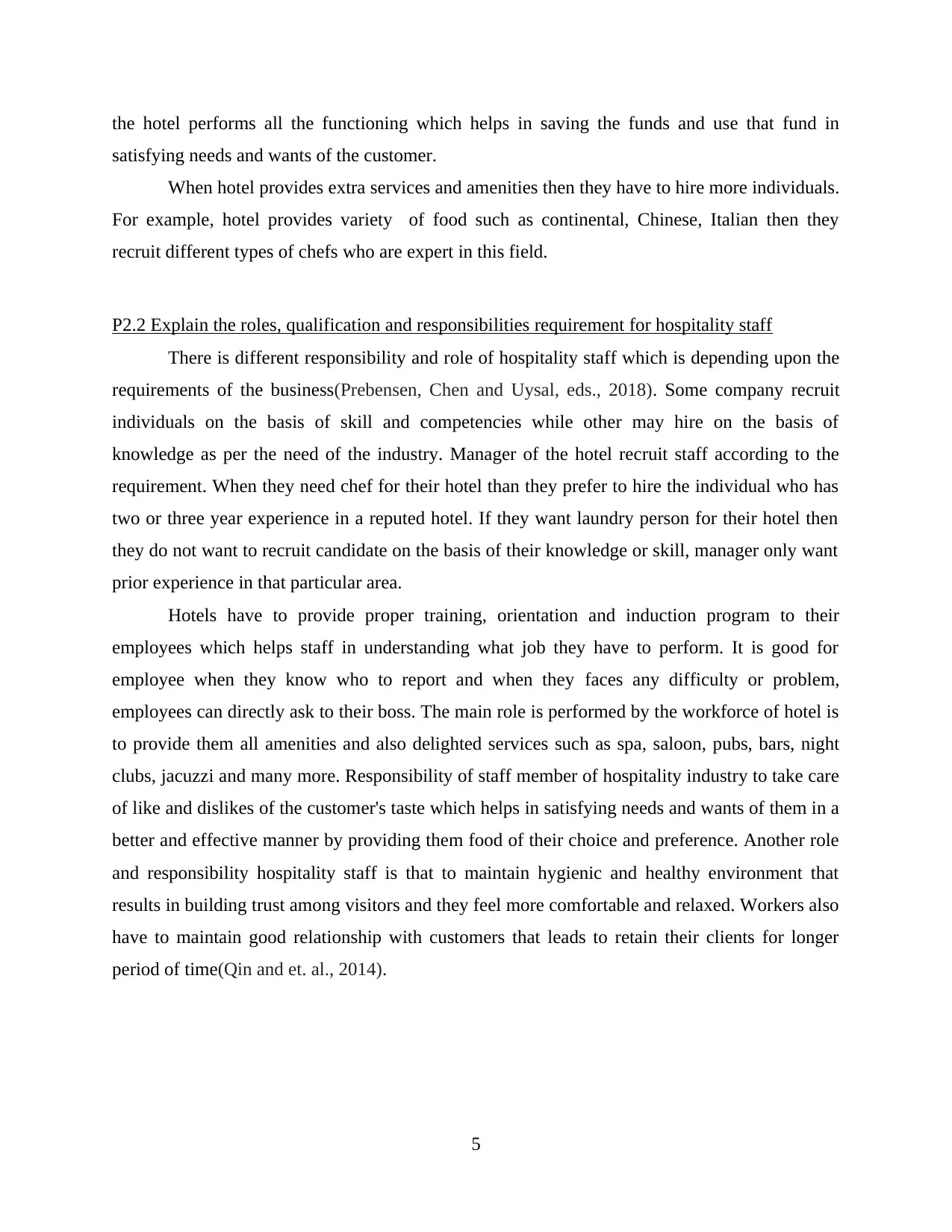
the hotel performs all the functioning which helps in saving the funds and use that fund in
satisfying needs and wants of the customer.
When hotel provides extra services and amenities then they have to hire more individuals.
For example, hotel provides variety of food such as continental, Chinese, Italian then they
recruit different types of chefs who are expert in this field.
P2.2 Explain the roles, qualification and responsibilities requirement for hospitality staff
There is different responsibility and role of hospitality staff which is depending upon the
requirements of the business(Prebensen, Chen and Uysal, eds., 2018). Some company recruit
individuals on the basis of skill and competencies while other may hire on the basis of
knowledge as per the need of the industry. Manager of the hotel recruit staff according to the
requirement. When they need chef for their hotel than they prefer to hire the individual who has
two or three year experience in a reputed hotel. If they want laundry person for their hotel then
they do not want to recruit candidate on the basis of their knowledge or skill, manager only want
prior experience in that particular area.
Hotels have to provide proper training, orientation and induction program to their
employees which helps staff in understanding what job they have to perform. It is good for
employee when they know who to report and when they faces any difficulty or problem,
employees can directly ask to their boss. The main role is performed by the workforce of hotel is
to provide them all amenities and also delighted services such as spa, saloon, pubs, bars, night
clubs, jacuzzi and many more. Responsibility of staff member of hospitality industry to take care
of like and dislikes of the customer's taste which helps in satisfying needs and wants of them in a
better and effective manner by providing them food of their choice and preference. Another role
and responsibility hospitality staff is that to maintain hygienic and healthy environment that
results in building trust among visitors and they feel more comfortable and relaxed. Workers also
have to maintain good relationship with customers that leads to retain their clients for longer
period of time(Qin and et. al., 2014).
5
satisfying needs and wants of the customer.
When hotel provides extra services and amenities then they have to hire more individuals.
For example, hotel provides variety of food such as continental, Chinese, Italian then they
recruit different types of chefs who are expert in this field.
P2.2 Explain the roles, qualification and responsibilities requirement for hospitality staff
There is different responsibility and role of hospitality staff which is depending upon the
requirements of the business(Prebensen, Chen and Uysal, eds., 2018). Some company recruit
individuals on the basis of skill and competencies while other may hire on the basis of
knowledge as per the need of the industry. Manager of the hotel recruit staff according to the
requirement. When they need chef for their hotel than they prefer to hire the individual who has
two or three year experience in a reputed hotel. If they want laundry person for their hotel then
they do not want to recruit candidate on the basis of their knowledge or skill, manager only want
prior experience in that particular area.
Hotels have to provide proper training, orientation and induction program to their
employees which helps staff in understanding what job they have to perform. It is good for
employee when they know who to report and when they faces any difficulty or problem,
employees can directly ask to their boss. The main role is performed by the workforce of hotel is
to provide them all amenities and also delighted services such as spa, saloon, pubs, bars, night
clubs, jacuzzi and many more. Responsibility of staff member of hospitality industry to take care
of like and dislikes of the customer's taste which helps in satisfying needs and wants of them in a
better and effective manner by providing them food of their choice and preference. Another role
and responsibility hospitality staff is that to maintain hygienic and healthy environment that
results in building trust among visitors and they feel more comfortable and relaxed. Workers also
have to maintain good relationship with customers that leads to retain their clients for longer
period of time(Qin and et. al., 2014).
5
Paraphrase This Document
Need a fresh take? Get an instant paraphrase of this document with our AI Paraphraser
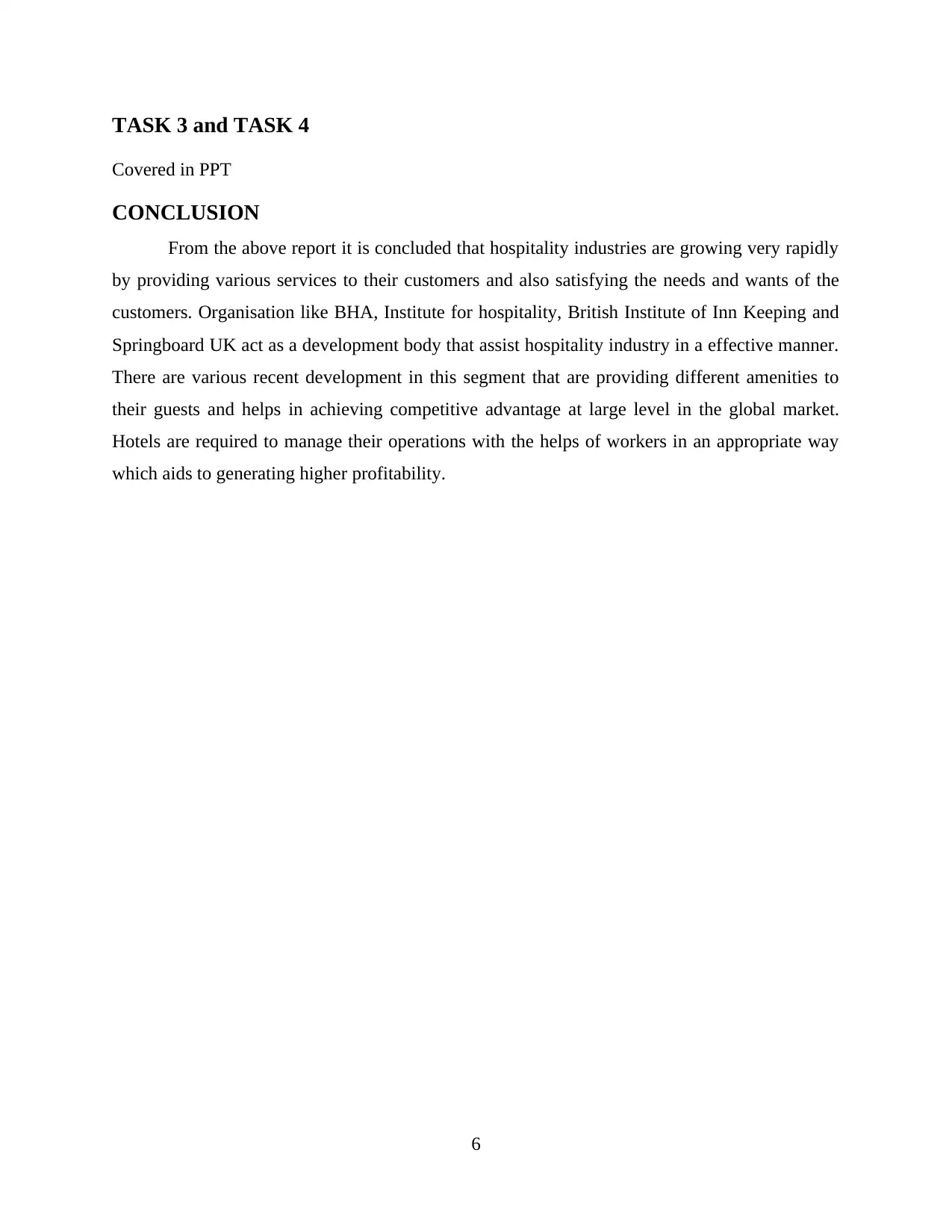
TASK 3 and TASK 4
Covered in PPT
CONCLUSION
From the above report it is concluded that hospitality industries are growing very rapidly
by providing various services to their customers and also satisfying the needs and wants of the
customers. Organisation like BHA, Institute for hospitality, British Institute of Inn Keeping and
Springboard UK act as a development body that assist hospitality industry in a effective manner.
There are various recent development in this segment that are providing different amenities to
their guests and helps in achieving competitive advantage at large level in the global market.
Hotels are required to manage their operations with the helps of workers in an appropriate way
which aids to generating higher profitability.
6
Covered in PPT
CONCLUSION
From the above report it is concluded that hospitality industries are growing very rapidly
by providing various services to their customers and also satisfying the needs and wants of the
customers. Organisation like BHA, Institute for hospitality, British Institute of Inn Keeping and
Springboard UK act as a development body that assist hospitality industry in a effective manner.
There are various recent development in this segment that are providing different amenities to
their guests and helps in achieving competitive advantage at large level in the global market.
Hotels are required to manage their operations with the helps of workers in an appropriate way
which aids to generating higher profitability.
6
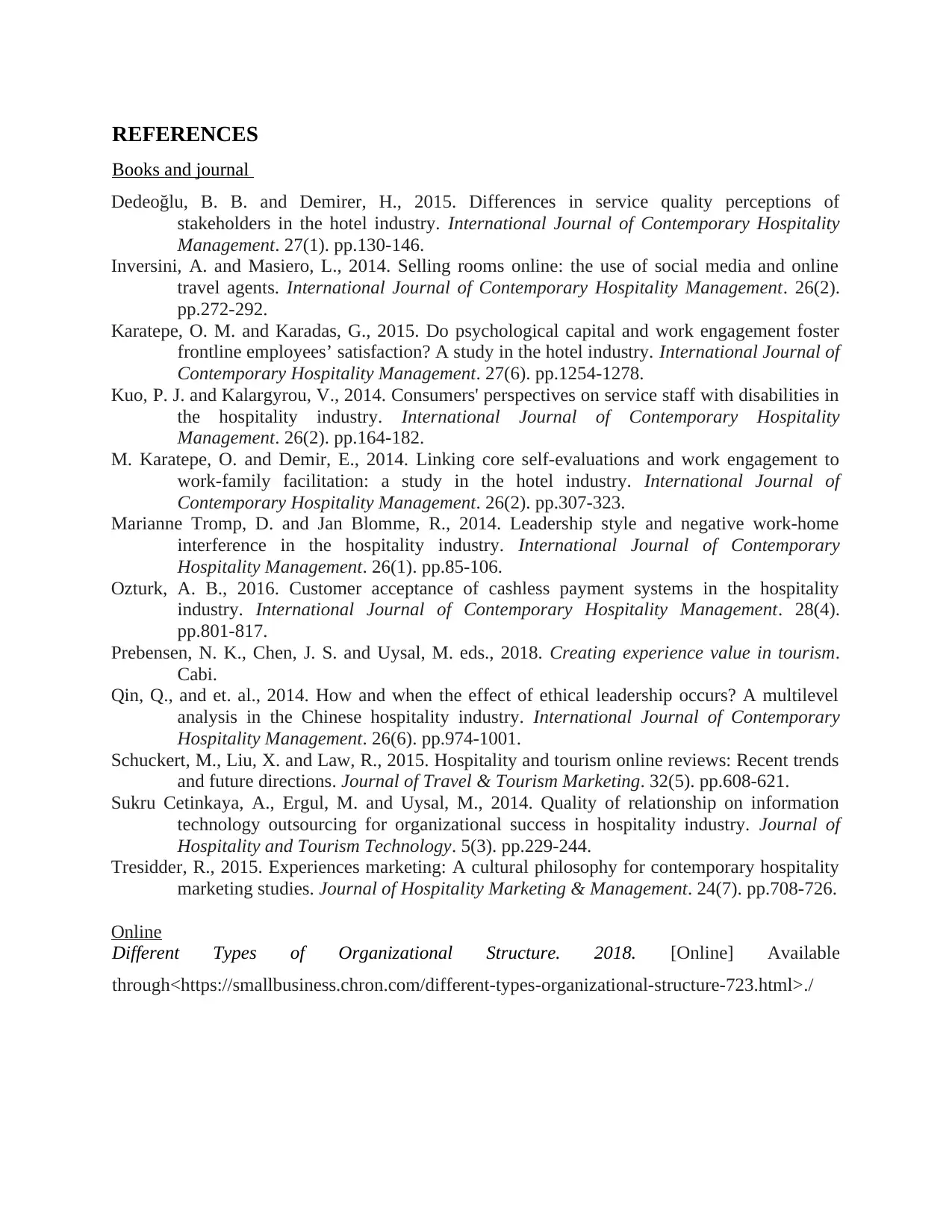
REFERENCES
Books and journal
Dedeoğlu, B. B. and Demirer, H., 2015. Differences in service quality perceptions of
stakeholders in the hotel industry. International Journal of Contemporary Hospitality
Management. 27(1). pp.130-146.
Inversini, A. and Masiero, L., 2014. Selling rooms online: the use of social media and online
travel agents. International Journal of Contemporary Hospitality Management. 26(2).
pp.272-292.
Karatepe, O. M. and Karadas, G., 2015. Do psychological capital and work engagement foster
frontline employees’ satisfaction? A study in the hotel industry. International Journal of
Contemporary Hospitality Management. 27(6). pp.1254-1278.
Kuo, P. J. and Kalargyrou, V., 2014. Consumers' perspectives on service staff with disabilities in
the hospitality industry. International Journal of Contemporary Hospitality
Management. 26(2). pp.164-182.
M. Karatepe, O. and Demir, E., 2014. Linking core self-evaluations and work engagement to
work-family facilitation: a study in the hotel industry. International Journal of
Contemporary Hospitality Management. 26(2). pp.307-323.
Marianne Tromp, D. and Jan Blomme, R., 2014. Leadership style and negative work-home
interference in the hospitality industry. International Journal of Contemporary
Hospitality Management. 26(1). pp.85-106.
Ozturk, A. B., 2016. Customer acceptance of cashless payment systems in the hospitality
industry. International Journal of Contemporary Hospitality Management. 28(4).
pp.801-817.
Prebensen, N. K., Chen, J. S. and Uysal, M. eds., 2018. Creating experience value in tourism.
Cabi.
Qin, Q., and et. al., 2014. How and when the effect of ethical leadership occurs? A multilevel
analysis in the Chinese hospitality industry. International Journal of Contemporary
Hospitality Management. 26(6). pp.974-1001.
Schuckert, M., Liu, X. and Law, R., 2015. Hospitality and tourism online reviews: Recent trends
and future directions. Journal of Travel & Tourism Marketing. 32(5). pp.608-621.
Sukru Cetinkaya, A., Ergul, M. and Uysal, M., 2014. Quality of relationship on information
technology outsourcing for organizational success in hospitality industry. Journal of
Hospitality and Tourism Technology. 5(3). pp.229-244.
Tresidder, R., 2015. Experiences marketing: A cultural philosophy for contemporary hospitality
marketing studies. Journal of Hospitality Marketing & Management. 24(7). pp.708-726.
Online
Different Types of Organizational Structure. 2018. [Online] Available
through<https://smallbusiness.chron.com/different-types-organizational-structure-723.html>./
Books and journal
Dedeoğlu, B. B. and Demirer, H., 2015. Differences in service quality perceptions of
stakeholders in the hotel industry. International Journal of Contemporary Hospitality
Management. 27(1). pp.130-146.
Inversini, A. and Masiero, L., 2014. Selling rooms online: the use of social media and online
travel agents. International Journal of Contemporary Hospitality Management. 26(2).
pp.272-292.
Karatepe, O. M. and Karadas, G., 2015. Do psychological capital and work engagement foster
frontline employees’ satisfaction? A study in the hotel industry. International Journal of
Contemporary Hospitality Management. 27(6). pp.1254-1278.
Kuo, P. J. and Kalargyrou, V., 2014. Consumers' perspectives on service staff with disabilities in
the hospitality industry. International Journal of Contemporary Hospitality
Management. 26(2). pp.164-182.
M. Karatepe, O. and Demir, E., 2014. Linking core self-evaluations and work engagement to
work-family facilitation: a study in the hotel industry. International Journal of
Contemporary Hospitality Management. 26(2). pp.307-323.
Marianne Tromp, D. and Jan Blomme, R., 2014. Leadership style and negative work-home
interference in the hospitality industry. International Journal of Contemporary
Hospitality Management. 26(1). pp.85-106.
Ozturk, A. B., 2016. Customer acceptance of cashless payment systems in the hospitality
industry. International Journal of Contemporary Hospitality Management. 28(4).
pp.801-817.
Prebensen, N. K., Chen, J. S. and Uysal, M. eds., 2018. Creating experience value in tourism.
Cabi.
Qin, Q., and et. al., 2014. How and when the effect of ethical leadership occurs? A multilevel
analysis in the Chinese hospitality industry. International Journal of Contemporary
Hospitality Management. 26(6). pp.974-1001.
Schuckert, M., Liu, X. and Law, R., 2015. Hospitality and tourism online reviews: Recent trends
and future directions. Journal of Travel & Tourism Marketing. 32(5). pp.608-621.
Sukru Cetinkaya, A., Ergul, M. and Uysal, M., 2014. Quality of relationship on information
technology outsourcing for organizational success in hospitality industry. Journal of
Hospitality and Tourism Technology. 5(3). pp.229-244.
Tresidder, R., 2015. Experiences marketing: A cultural philosophy for contemporary hospitality
marketing studies. Journal of Hospitality Marketing & Management. 24(7). pp.708-726.
Online
Different Types of Organizational Structure. 2018. [Online] Available
through<https://smallbusiness.chron.com/different-types-organizational-structure-723.html>./
⊘ This is a preview!⊘
Do you want full access?
Subscribe today to unlock all pages.

Trusted by 1+ million students worldwide

2
1 out of 10
Related Documents
Your All-in-One AI-Powered Toolkit for Academic Success.
+13062052269
info@desklib.com
Available 24*7 on WhatsApp / Email
![[object Object]](/_next/static/media/star-bottom.7253800d.svg)
Unlock your academic potential
Copyright © 2020–2026 A2Z Services. All Rights Reserved. Developed and managed by ZUCOL.





